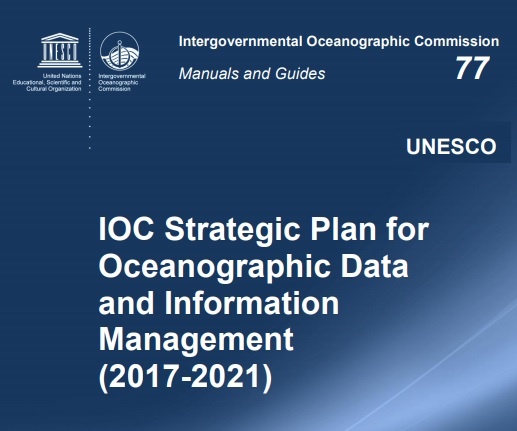IOC Strategic Plan for Oceanographic Data and Information Management (2017-2021)


The IOC* Strategic Plan for Oceanographic Data and Information Management (2017-2021) - published in English on 22/08/17 (UNESCO 2017) - is available as IOC Manuals and Guides No. 77 through http://www.iode.org/mg77.
Within the context of IOC the following definitions for data and information are used:
|
The vision of the Strategic Plan is to
to achieve: “A comprehensive and integrated Ocean Data and Information System, serving the broad and diverse needs of IOC Member States, for both management and scientific use”. The concept of delivering a data and information service for the “global ocean commons” (i.e. global public good) is central to this vision.
The objectives of the Strategic Plan are to:
- Facilitate and promote the exchange of oceanographic data and information in compliance with the IOC Oceanographic Data Exchange Policy;
- Deliver a comprehensive distributed data system that can receive data collected by all IOC programmes and projects and deliver them in a uniform and transparent way to all users;
- Deliver a system that can collect bibliographic and factual information from all IOC programmes and projects and deliver them in a uniform and transparent way to all users; and
- Ensure alignment with, and contribution to, both the IOC’s Medium-Term Strategy for 2014-2021, and with the UN’s 2030 Agenda for sustainable development, in particular the dedicated sustainable development goal for the ocean (Conserve and sustainably use the oceans, seas and marine resources for sustainable development).
The IOC Data and Information Management System resulting from this strategy will deliver:
- Assembled, quality controlled and archived data on a diverse range of variables according to scientifically sound and well-documented standards and formats;
- Timely dissemination of data on a diverse range of variables (observations and model outputs) both on real-time and delayed modes depending on the needs of user groups and their technical capabilities (automatic dissemination as well as “on demand”); and
- Easy discovery and access to data and information on a diverse range of variables and derived products (including forecasts, alerts and warnings) by users who have a broad range of capabilities.
The IOC Data and Information System will provide seamless access to the real-time and delayed-mode oceanographic data and services across all IOC and related programmes, handling data from the point of collection, through processing and quality control, to archival and dissemination.
The IODE developed Ocean Data Portal (ODP), as well as other similar partner systems, will facilitate the exchange and dissemination of data and services and will be key components to deliver the objectives of the IOC Strategic Plan for Data and Information Management. The ODP makes data and services available freely and without restriction in a timely and user-friendly way through a single entry point. Training programme for establishing ODP nodes has been developed for further contributions to IODE Ocean Teacher Academy. Read more… |
* Intergovernmental Oceanographic Commission (IOC) of UNESCO was established in 1961.

